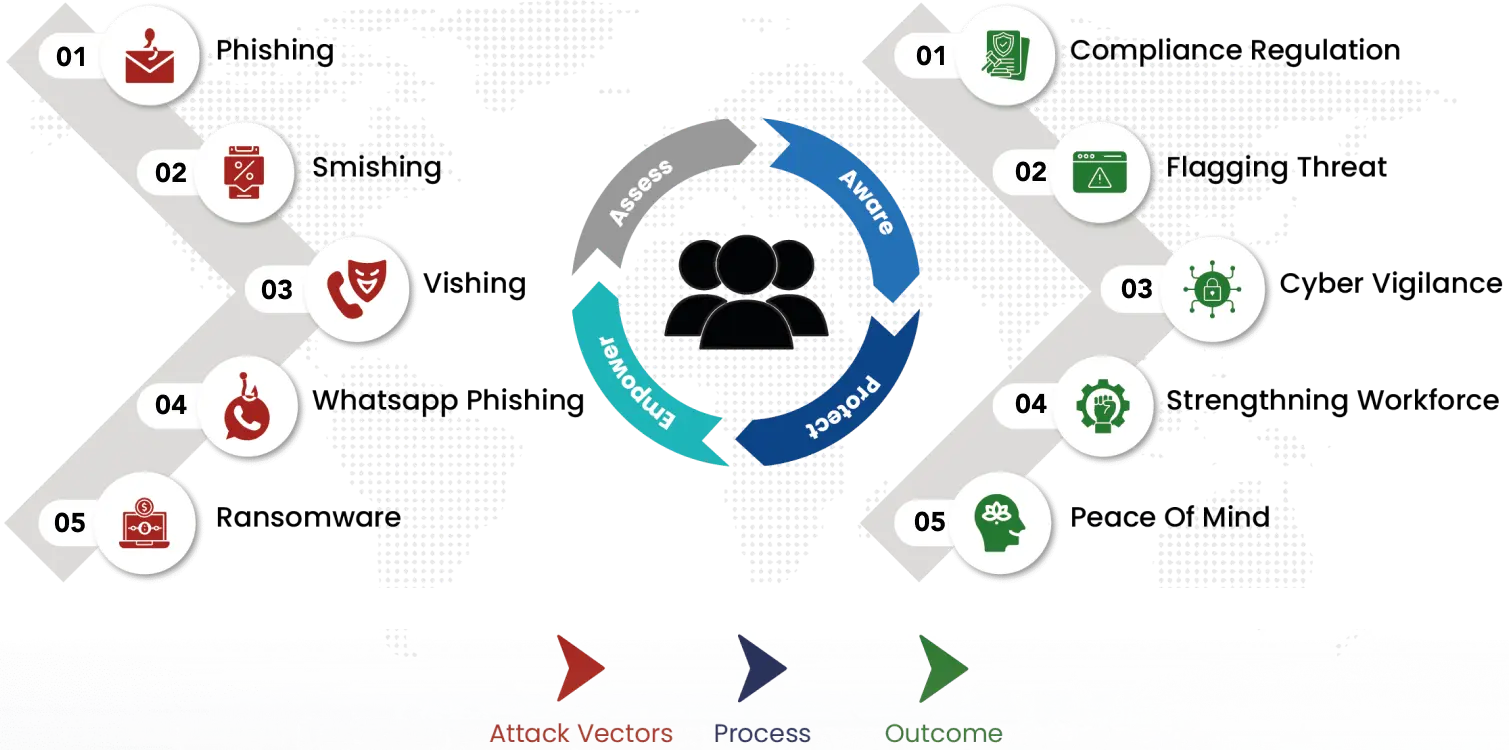In this era of technology, People Security Management (PSM) has become crucial. Many organizations focus on technological defenses but often overlook the human element, a key vulnerability. This blog explores the risks of ignoring cybersecurity awareness, highlighting PSM’s vital role in people-centric security.
Table of Contents
TogglePSM offers a strategic focus on the human factor within organizations, typically seen as the weakest link. It involves creating policies, implementing practices, and initiating training based on extensive threat intelligence. This strategy strengthens an organization’s defense by addressing human vulnerabilities, behaviors, and decision-making.
Neglecting People Security: A High Cost
Increased Security Breaches
Neglecting appropriate people security practices might have grave consequences. According to Cybersecurity Ventures, by 2021, cybercrime – which includes data loss, financial fraud, lost productivity, theft of intellectual property, and other crimes – may cost the global economy $6 trillion yearly.
Consequences in the Real World
Numerous instances show severe breaches due to inadequate employee centric Security. Imagine a scenario where a well-known financial institution faces a major data breach. This breach occurs because an employee unknowingly falls for a sophisticated phishing scam, revealing sensitive client data. The consequences include substantial financial losses, legal ramifications, reputational damage, and a loss of customer trust.
Read More: Microsoft Teams Attacks: Hackers Pose as Tech Support
This example underscores the importance of robust cybersecurity awareness and training programs like those offered by Threatcop to prevent such incidents. Comprehensive solutions like TSAT (Threatcop Security Awareness Training) and TPIR (Threatcop Phishing Incident Response), aims to significantly reduce such risks by educating and empowering employees to recognize and respond effectively to cyber threats.
Leading the Way in People-Centric Cybersecurity with PSM
Comprehensive People Security Approach
People Security Management adopts a four-pronged strategy to combat cyber threats, including vulnerability assessment, organizational awareness, robust protection measures, and empowering employees to defend against cyber threats.
The Unique AAPE Model: A Foundation of People Security
PSM strategy is anchored in the AAPE Model—Assess, Aware, Protect, Empower. This transforms employees at all levels into a strong defense line against cyber threats, starting from vulnerability assessment to empowerment with the skills and tools needed for organizational protection.

Empowering Employees
PSM transcends traditional cybersecurity by cultivating a proactive culture. Interactive and realistic simulated attacks help transform the workforce into an alert and informed defense system.
Customized Training and Ongoing Enhancement
Cybersecurity training is customized to each organization’s specific needs, combined with constant feedback and improvements, preparing employees for the ever-changing threat landscape.
Advantages of Adopting PSM
More than Risk Reduction
Implementing PSM, as seen with platforms like Threatcop, extends beyond minimizing risks. It includes regulatory compliance and safeguarding the organization from legal repercussions of data breaches.
Considerable Long-Term Financial Gains
By preventing security incidents, investing in PSM can result in significant cost savings in terms of minimizing costs associated with breach recovery, legal fees, and reputation harm. According to research by the Ponemon Institute, the typical cost of a data breach is roughly $3.86 million.
Enhancing Brand Resilience
Organizations that emphasize cybersecurity awareness via PSM are viewed as responsible and reliable, attracting both customers and security-minded employees.
Conclusion
Overlooking People Security Management can have dire consequences for organizations in today’s digitally dominated world. Integrating PSM, as demonstrated by Threatcop, is key to developing a robust, informed, and proactive workforce, effectively reducing cyber threats. This transformation turns employees from security liabilities into informed protectors, significantly boosting an organization’s cybersecurity stance.
FAQs
PSM ensures employees know and follow best cybersecurity practices and legal requirements, aiding in meeting various regulatory standards.
By avoiding breaches and fostering a secure image, PSM positively affects an organization’s market value and customer trust.
People Security Management (PSM) is a strategy that focuses on human vulnerabilities in cybersecurity, training employees to effectively identify and respond to cyber threats.
Threatcop uses interactive simulations and real-life scenarios to foster behavioral change and resilience, rather than just theoretical knowledge.
By educating and empowering employees, PSM significantly lowers the risk of breach occurrences due to human errors.
Co-Founder & COO at Threatcop
Department: Operations and Marketing
Dip Jung Thapa, Chief Operating Officer (COO) of Threatcop, a leading cybersecurity company dedicated to enhancing people security management for businesses. With a profound understanding of cybersecurity issues, Dip plays a pivotal role in driving Threatcop’s mission to safeguard people’s digital lives.
Co-Founder & COO at Threatcop Department: Operations and Marketing Dip Jung Thapa, Chief Operating Officer (COO) of Threatcop, a leading cybersecurity company dedicated to enhancing people security management for businesses. With a profound understanding of cybersecurity issues, Dip plays a pivotal role in driving Threatcop's mission to safeguard people's digital lives.
